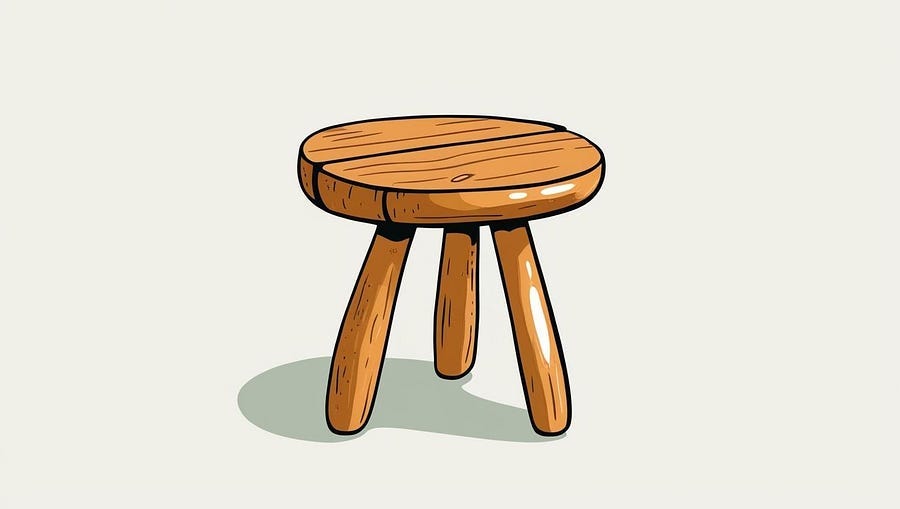
The most underrated book I’ve ever read is ‘Happy Mind, Happy Life’ by Dr Rangan Chatterjee.
If you’ve never read it before, it highlights 10 formidable ways we can increase our happiness. Despite the profound impact it’s had on my life, this book flies under the radar. It’s time to change that.
Here’s what you need to know.
Happiness Is A 3-Legged Stool

Imagine happiness as a stool with 3 legs. For happiness to remain stable, it must be supported by:
Contentment — being at peace with where we are in life right now (or at least where we are heading).
Control — feeling confident that nothing has the power to overwhelm us (within reason).
Alignment — the person we want to be and the person we are actually being are the same (or very close).
If even one of these legs is taken away, our happiness wobbles — or collapses entirely.
How content, in control, & aligned do you feel right now?
10 Simple Lessons on Happiness
Here’s Rangan’s unique tips for living a happier life:
#1 Don’t Mistake Success for Happiness
Rangan knows a lot of rich, successful people who are miserable.
Despite having everything they could want (nice cars — yes plural, a mansion of a house, their own family and plenty of holidays), they aren’t happy. Success isn’t everything.
Whilst you chase your dreams, remember:
True happiness comes from: contentment, control, and alignment.
#2 Eliminate Choice
Too many choices throughout the day = lots of dwelling on whether you made the right choice + mental exhaustion.
Don’t waste your time on menial choices. Instead of spending 45 minutes scrolling through Netflix for a movie, create a pre-made watchlist to simplify things.
The less time you spend on trivial choices, the more mental energy you have for meaningful ones.
#3 Treat yourself with respect
Studies show that people who have a kinder inner-head voice tend to be happier.
Ditch the swear words and insults, and stop talking to yourself like you are your very own Sergeant.
Would you speak to a friend the way you speak to yourself? If not, change the dialogue.
#4 Get into the ‘flow state’ more often by improving at a skill you love
Ever get so lost in an activity that time flies?
That’s called flow state, and it’s scientifically linked to happiness. To achieve flow, you need a challenge that’s just slightly above your current skill level (about 4% more difficult to be precise).
Have you left your favourite hobby in the dust recently?
Tennis
Painting
Playing the piano
Online writing!?
Here’s your excuse to pick it back up.
#5 Become fully in control of your reactions
If somebody upsets you, always seek to know the other side of the story and avoid BESERK mode at all costs.
Make an excuse for why they did what they did (even if it’s completely false). This benefits you as your anger will dissipate.
Example: Someone cuts you off in traffic. Instead of fuming, think: “They must be rushing to donate their life savings to charity.”
Rangan refers to this as “making everyone a hero”.
#6 Talk to strangers
A social experiment with London commuters showed that they were happier when they initiated short, light-hearted conversations with strangers — instead of keeping to themselves.
Before the experiment, they believed that strangers would react negatively to their suspicious desire to chat — it’s London after all. But most reacted positively instead!
The result? These commuters felt happier.
#7 Ditch the phone more often
Your phone steals your presence.
Studies show that having your phone nearby — even if you don’t use it — reduces the quality of your experiences.
Try this:
Use “Do Not Disturb” mode more often.
Delete addictive social media apps (the added resistance of having to type them into Google is enough friction to reduce usage!).
Ban phones during meals, game nights, and quality time.
What’s one moment in your day where you can go phone-free?
#8 Take off the mask when necessary
We all put on a mask in certain situations — that’s normal.
But make sure you have honest conversations with people you trust when you’re feeling down.
Whether it’s about mental health, regrets, or personal traumas: you’ll feel much better for talking about it afterwards.
#9 Go on holiday every day
One of the greatest things about holidays is that they give our minds breathing space to relax and reflect on life, without the background stresses of home life.
You don’t need a holiday for this though. You can mimic it through:
Exercise
Yoga
Journalling
Meditating
Quiet times in the day (away from technology)
A wise man once said: “All of humanity’s problems stem from the inability to sit quietly in a room alone”.
#10 Give
Those who are ‘other people focussed’ tend to be happier than those who are ‘self-focussed’.
Many religions centre around serving others, forgiveness and being grateful for everything that’s good. There is wisdom to be found here as such things make us happier.
Try to do 1 act of kindness for somebody every day — it doesn’t matter how small it is! Smile at one person as you walk past them.
Afterword
10 lessons at once can feel overwhelming. Don’t try to implement all of them straight away.
A couple of lessons will have resonated more so than others. They are the ones that align with your current needs. Implement 1 or 2 and see if they improve your life.
Personally, I’m focusing on #7: Ditching my phone more often (because Substack has me doomscrolling!).
Let’s make these lessons more well-known — because happiness shouldn’t be underrated.
Hi, I’m Joe!
I hope you enjoyed this article on ‘Happy Mind, Happy Life’. For further tips on happiness, become a subscriber using the link below. I also write about:
💪 Building your Dream Body
🏃♂️ Running Marathons
📚 Other Life-Changing Books
📈 Self-Improvement
✍️ Becoming a Better Writer




#2 and #8 feel like personal attacks to me 😂😂😂 well.. each one's an art I'd love to master! This is VERY insightful. Great one Joe
Nice! I really like #5 – Become fully in control of your reactions. This is work in progress for me, and I believe that even when we lose control of our reactions, simply acknowledging it afterward helps us improve in this direction.